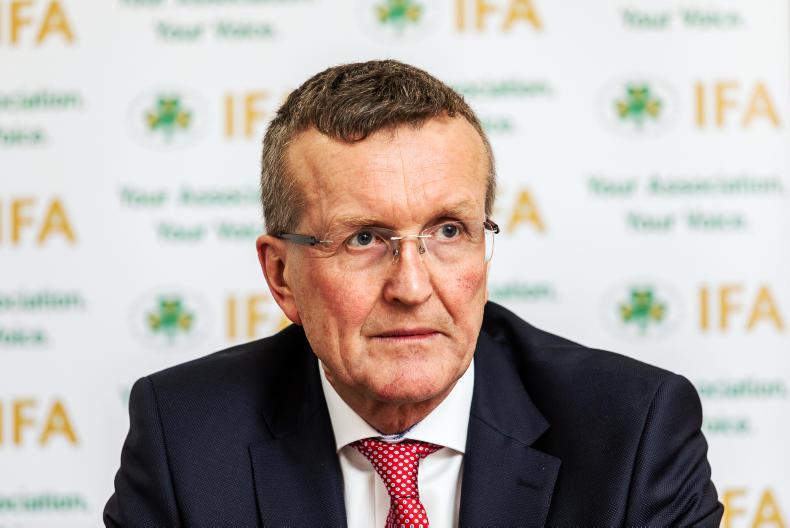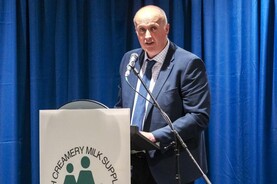The IFA president Tim Cullinan has said it was extraordinary to hear Taoiseach Micheál Martin dismiss the independent report by KPMG into the impact of emissions ceilings on farming as “scaremongering”, while the Government itself hasn’t done an economic impact assessment.
The Taoiseach was asked on RTÉ’s Morning Ireland on Tuesday if he accepted that there could be 10,000 jobs lost in the event of a 21% cut in emissions as outlined in the report.
“I don't. And I think we need to be very careful of that scaremongering as well. And I think everybody needs to be as well,” he said.
The report by commissioned by the Irish Farmers Journal.
Cullinan said that the IFA has repeatedly asked for such an exercise to be carried out by the Government, but it has refused to do so.
Shooting in the dark
“Micheál Martin is shooting in the dark and he has no idea what the economic or social impact of these ceilings will be in rural areas.
“If anything, the KPMG report might underestimate the impact of carbon budgets on farmers as it does not factor in the cost increases for energy and transport which farmers will also have to carry,” he said.

IFA president Tim Cullinan. / Philip Doyle
“The question the Taoiseach needs to answer is: if he doesn’t agree with the KPMG analysis, what impact does he think the Government’s proposed emissions ceilings will have on the sector?”
Concerned
The IFA president said farmers are genuinely concerned about what this will mean for their livelihoods and they have been looking for straight answers which tell them what they could be facing.
“I want to reiterate that the Government should stop trying to communicate with farmers over the airwaves, or indeed across mart rings, instead, they should sit down with elected farm leaders to make a proper plan for the sector,” Cullinan said.
Pay farmers for biodiversity
The Taoiseach said that climate change is going to be very damaging to the economy and steps need to be taken to improve upon that.
Micheál Martin commented: “I also believe that we need to switch more towards giving income to farmers to protect our biodiversity through a variety of imaginative schemes that will for example, enable them to grow native tree species and fund that, which will have an impact on terms of cleaning our waterways and our rivers which are in a bad state at the moment."
When asked if that meant farmers would be paid to produce less, he said “it could mean that” and that it could also mean alternative sources of income other than the present day sources of income.
“It could mean better, and a greater degree of, organic farming for example, which we made a start in terms of the announcements by Charlie McConalogue in the context of the Common Agricultural Policy that there will be far great resources allocated towards that."
New technologies
An Taoiseach continued: “It could also mean, and will mean, investments in new technologies around reducing carbon emissions in terms of food production, and in terms of agricultural practices as well.
“Some very progressive farmers are moving on that already. We have to do more in terms of the research, and I would like to see stronger capacity in our research bodies, particularly Teagasc and others, our universities, to focus in on that issue over the coming years.”
Read more
Carbon targets: 56,400 rural jobs on the line
In full: the KPMG economic impact report on cutting emissions on farming
The IFA president Tim Cullinan has said it was extraordinary to hear Taoiseach Micheál Martin dismiss the independent report by KPMG into the impact of emissions ceilings on farming as “scaremongering”, while the Government itself hasn’t done an economic impact assessment.
The Taoiseach was asked on RTÉ’s Morning Ireland on Tuesday if he accepted that there could be 10,000 jobs lost in the event of a 21% cut in emissions as outlined in the report.
“I don't. And I think we need to be very careful of that scaremongering as well. And I think everybody needs to be as well,” he said.
The report by commissioned by the Irish Farmers Journal.
Cullinan said that the IFA has repeatedly asked for such an exercise to be carried out by the Government, but it has refused to do so.
Shooting in the dark
“Micheál Martin is shooting in the dark and he has no idea what the economic or social impact of these ceilings will be in rural areas.
“If anything, the KPMG report might underestimate the impact of carbon budgets on farmers as it does not factor in the cost increases for energy and transport which farmers will also have to carry,” he said.

IFA president Tim Cullinan. / Philip Doyle
“The question the Taoiseach needs to answer is: if he doesn’t agree with the KPMG analysis, what impact does he think the Government’s proposed emissions ceilings will have on the sector?”
Concerned
The IFA president said farmers are genuinely concerned about what this will mean for their livelihoods and they have been looking for straight answers which tell them what they could be facing.
“I want to reiterate that the Government should stop trying to communicate with farmers over the airwaves, or indeed across mart rings, instead, they should sit down with elected farm leaders to make a proper plan for the sector,” Cullinan said.
Pay farmers for biodiversity
The Taoiseach said that climate change is going to be very damaging to the economy and steps need to be taken to improve upon that.
Micheál Martin commented: “I also believe that we need to switch more towards giving income to farmers to protect our biodiversity through a variety of imaginative schemes that will for example, enable them to grow native tree species and fund that, which will have an impact on terms of cleaning our waterways and our rivers which are in a bad state at the moment."
When asked if that meant farmers would be paid to produce less, he said “it could mean that” and that it could also mean alternative sources of income other than the present day sources of income.
“It could mean better, and a greater degree of, organic farming for example, which we made a start in terms of the announcements by Charlie McConalogue in the context of the Common Agricultural Policy that there will be far great resources allocated towards that."
New technologies
An Taoiseach continued: “It could also mean, and will mean, investments in new technologies around reducing carbon emissions in terms of food production, and in terms of agricultural practices as well.
“Some very progressive farmers are moving on that already. We have to do more in terms of the research, and I would like to see stronger capacity in our research bodies, particularly Teagasc and others, our universities, to focus in on that issue over the coming years.”
Read more
Carbon targets: 56,400 rural jobs on the line
In full: the KPMG economic impact report on cutting emissions on farming







 This is a subscriber-only article
This is a subscriber-only article











SHARING OPTIONS: